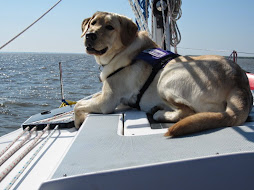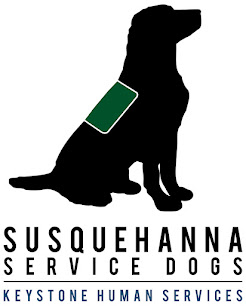Today, several people are meeting the dog that may become
their service dog!
Here at Susquehanna Service Dogs, we go to great lengths to
match each person with a dog and make sure that the service dog team is
successful. This matching process starts with Meet the Dogs.
Once a person has completed the application process and has
had a home visit, they’re placed on our waiting list until we have one or more
dogs that meet their needs. The waiting list is necessary because we may not
have a dog in advanced training that meets their needs. For example, if a
person needs a balance dog, we cannot invite them to Meet the Dogs until we
have a potential balance dog available, even if that person is at the top of
the waiting list. Not all dogs are suited to every type of work, and in the
case of balance dogs, it takes a very specific set of skills and attributes for
a dog to be suited to balance work.
When we have one or more dogs that fit a person’s needs,
that’s when we give them the call – the call to come meet their potential
service dog.
Asking the Right
Questions
Before people even meet any of the dogs at Meet the Dogs, we
spend some time talking with them about their needs and wishes. Our goal is to
find out how the dog would be able to assist them. We go through a list of
daily activities that are made more difficult because of their disability. A
person can have more than one disability. For example, they could have a
psychiatric disability, a balance issue and a hearing issue. We ask them
questions and have them rate the difficulty of performing each daily activity.
From their answers, we come up with a list of behaviors and
tasks the dog can be trained to do to mitigate that person’s disability. Six
months after a person has been placed with their service dog, we come back to
these answers and ask them the same questions. This time, we have them rate the
difficulty of performing daily tasks with the assistance of their service dog.
This way, we can evaluate how effective the dog is.
At Meet the Dogs, we talk about clicker training and the
treat pouch, as well as the types of dogs the person likes. We want to get an
idea of the type of personality the person is looking for in a dog. For
example, we might think that a dog is great for a person, but if that dog loves
to give kisses and that person doesn’t like dogs that lick, the match isn’t
going to work.
Meeting the Dogs
After we spend some time talking with the person, they get
to meet the dogs. Each person meets at least two dogs, one at a time. One of
our volunteers brings a dog into the room and the dog and person have a chance
to greet each other. The person gives the dog treats to get the dog to focus on
them. Then the handler moves the dog away from the person, and we have the
person give the dog a series of cues.
First, the person calls the dog to come, and they click and
treat as the dog is on its way. The person also asks the dog to sit and down,
and then they have the chance to just hang out for a little bit. During this
process, we observe both the person and the dog. We look at how the person does
with clicker training, and how the dog and person react to each other. We look
at whether the dog wants to stay with that person and whether the dog is
focusing on the person or the treat pouch. Then we have the person and dog move
around the room, whether the dog is walking on a leash, wearing a balance
harness or walking beside a wheelchair.
We make it clear right from the start that the person is not
going to pick the dog. However, they do have an opinion in which dog they get. After
the person goes through this process with a second dog, we ask them which dog
they liked better and why they liked that particular dog. We also ask why they
didn’t like the other dog as much. These questions are similar, but the answers
give us great insight into the potential match. Each person answers these
questions about each dog they meet. We also ask the person if there was a dog
that they absolutely would not be able to work with and if there was a dog that
they would be able to work with, even though it may not be their first choice.
We always video these sessions because we learn a lot about
how we’re going to continue a dog’s training for that person. Each dog is
trained specifically for that person. For example, if a person’s wheelchair
needs to have a special hookup for the dog, we can duplicate it in training. We
also look at how a person may have to deliver treats to the dog. Will the
person be handing the treats to the dog, will they be pushing the treats onto
the floor or into a bowl, etc.? If a person walks with a certain gait, we video
that as well and try to duplicate it in the dog’s training. Our goal is to
prepare the dog to be successful with their partner.
We let each person know that we can train the dogs to do
certain skills. Many people are surprised by the things that a service dog can
be trained to do. We always ask people if certain skills are something that
they would like the dog to be able to do.
Making the Match
Although people go through the matching process at Meet the
Dogs, they aren’t actually matched with a specific dog until later. We take
time to review everything we learn at Meet the Dogs so that we can make wise
decisions when pairing a dog with a person. We need to match the right person
and dog, as well as match the right dog to the job they will need to do. For
example, if a person needs a hearing dog, we will give them a dog that enjoys
alerting to sounds. That way, the dog will wake up in the middle of the night
and alert their partner when the smoke alarm is going off, or they’ll wake up
their partner when their alarm clock is beeping. Matching the dog to the job
makes training very easy, and makes for a happy service dog.
Once we have a match, we notify each person. We don’t always
let them know which dog they’ve been matched with because the reality is that
not all dogs make it through the program, even once they get to advanced
training. We don’t like to get someone’s hopes up about a specific dog, only to
have to tell them that that dog has been released and they’ve been paired with
a different dog.
If a person is not matched with a dog, they will be invited
to the next Meet the Dogs if we have a dog that may meet their needs.
Our matching process is one of the things that makes
Susquehanna Service Dogs unique. We’re very meticulous with our matching
process. We want each person and dog to become a successful team.










Thanks for posting this and making it all seem more logical. We often wonder why the one we thought was "best" for us is not of the same choosing of the trainers. This makes a lot more sense now that it's been included in the blog.
ReplyDeleteThank you!
I just want to say the way: SSD matching process is does makes Susquehanna Service Dogs unique. I have my second hearing dog from SSD and it's so hard to pick. My first dog, They picked her for me. She was my gift of love and just perfect. Today I have my second dog and I picked him. I believe when you need a helping hand when meeting the dogs. If you are like me. It's so hard to pick because they all are so loving. The Staff does a wonderful job helping you with your match. Good Luck everyone when you meet the dogs. I have two of the best that came from SSD. Thank You SSD for just being there for us.
ReplyDeleteThank you for posting the above information. It illuminated the selection process quite a bit for me. It feels like one can see behind the scenes and understand your point of view. I realize now why it is such a long process to finally receive the service dog that's right for each client.
ReplyDeleteVery informative - thanks for posting.
ReplyDeleteOver the years there have been many changes at SSD. I chose my first dog and we were a great team, however, it would have been interesting to see if the above process would have matched us. Trusting in the professionals I look forward to the day I meet my successor dog. Experience is an excellent teacher and the skills gained by the SSD team and those who have worked with a service dog help make this program a success. Thank you for sharing the selection process. I look forward to what lies ahead.
ReplyDelete